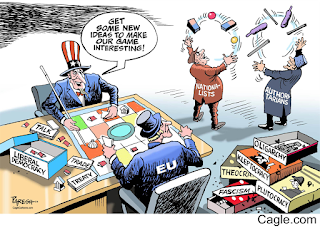continues to poison the trans-Atlantic climate. His comments about
Germany have been particularly toxic—and, beyond that, stupid,
reflecting no understanding of the country’s strategic importance or its
dreadful history.
stated the matter plainly in a speech on Sunday in Bavaria. Europeans
“must take our fate into our own hands,” she said, because the “times in
which we could rely fully on others … are somewhat over.” This, she
added, “is what I experienced in the last few days”—a reference to
Trump’s behavior in Brussels and Rome, where, among other bits of
rudeness, he declined to pay even lip service to the pledge, enshrined
in Article 5 of the North Atlantic Treaty, that the United States would
defend any member of NATO that comes under attack.
,
“We have a MASSIVE trade deficit with Germany, plus they pay FAR LESS
than they should on NATO and military. Very bad for U.S. This will
change.” While overseas, Trump had
Jean-Claude Juncker, president of the European Union, “The Germans are
bad, very bad. Look at the millions of cars that they’re selling in the
USA. Horrible. We’re gonna stop that.” Press Secretary Sean Spicer
denied the report, which appeared in
, but Trump’s
Tuesday tweet undercut the denial and underscored his complaint. It
wasn’t some loose remark, he seemed to be saying; he meant it.
But Trump’s ire is misplaced or unwise on several levels.
First, yes, Americans buy a lot of German cars, but this isn’t because
Germany is dumping BMWs and Volkswagens on the U.S. market; it’s because
a lot of Americans
like those cars. Second, as my colleague
Daniel Gross
has pointed out, lots of those German cars are made in the United
States; a BMW plant in South Carolina—the company’s biggest plant in the
world—churns out 400,000 cars a year.
The thing is, Trump knows this. When Merkel visited Washington in March,
she brought
along the CEOs of BMW, Siemens, and Schaeffler, an industrial-parts
manufacturer, who met with Trump for an hour, briefing him on their $300
billion investment in the American economy and the 750,000 American
jobs that their plants had created. By all accounts, Trump was
impressed.
Perhaps the most wondrous thing about the world that took form after
World War II has been the absence of war between the longstanding rivals
in Europe—not just the absence of wars but the disappearance of the
notion that European wars were inevitable. This feat didn’t come about
by some miracle or accident. It was the result of painstaking effort to
build an alliance based on shared values and common interests, requiring
trillions of dollars in aid and investment, the maintenance of massive
military bases, and—in particularly trying times—a crisis or two that
risked another, far more cataclysmic war. It is this alliance—and the
international order on which it stands—that Trump’s tantrums and
indifference are endangering.
European
leaders realized last week (you could see it on their faces as they
watched Trump speak)—that the alliance will be in some degree of
abeyance as long as this guy is president.
It may be no coincidence that Russian President Vladimir
Putin’s chief foreign-policy goal is to restore the old Soviet Union. He
can do that only if the European Union is weakened and the ties between
the United States and Europe are severed. He may have reason to believe
that his dream might come true. Whatever the probes reveal about
Trump’s ties or obligations (or lack of any connections whatever) to
Russia, his signs of indifference to the fate of Europe are no doubt
causing Putin to salivate more than he thought he ever would.



